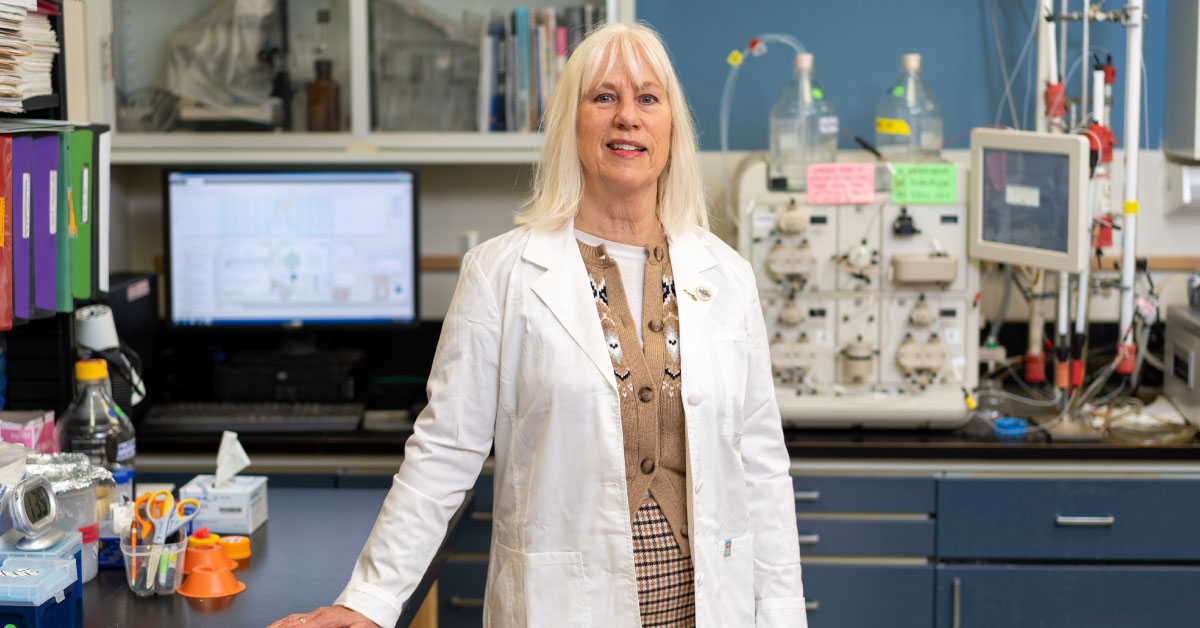TTUHSC’s Cornwall to Investigate Structure of Brain Extracellular Matrix

Gail Cornwall, Ph.D.
The brain extracellular matrix (ECM), which comprises approximately 20% of the total volume of the adult human brain, is a network of proteins and polysaccharides (carbohydrates) found in the space between the brain’s neurons and glia (cells that support the neurons).
The ECM plays a critical role in synaptic plasticity, including experience/adaptive-based changes in brain function. This suggests an inherent malleability in ECM structure, and although changes in certain other ECM molecules contribute to ECM remodeling, the underlying mechanisms that enable ECM plasticity are still unknown. Synaptic plasticity is a term used to describe the adaptations that occur at the synapse (the space for chemical communication that exists between individual neurons), which strengthens or weakens synaptic connections.
To help uncover some of these mechanisms, the National Institutes of Health-National Institute on Aging recently awarded a two-year, $420,750 R21 grant to Gail Cornwall, Ph.D., from the Department of Cell Biology and Biochemistry at the Texas Tech University Health Sciences Center School of Medicine. R21 grants are awarded for exploratory projects to test novel ideas.
“We previously studied functional amyloids (protein aggregates that play beneficial roles in a variety of biological processes such as storage, signaling and long-term memory) in a matrix that surrounds maturing sperm in the epididymis,” Cornwall said. “We’re proposing that a similar structure surrounds the neurons in the brain as part of the normal ECM. So the novelty we’re proposing is that functional amyloids are a normal component of the brain ECM.”
Cornwall’s central hypothesis is that functional amyloids, including CRES (cystatin-related epididymal spermatogenic) subgroup members, are critical elements of the brain ECM infrastructure that ultimately determine changes in organism behavior. Her hypothesis is based on preliminary studies which showed that CRES is found in astrocytes (star-shaped cells in the central nervous system) and specific populations of neurons, both of which contribute to the production of the brain ECM. Behavioral studies conducted by her collaborator, Jeremy Bailoo, Ph.D., showed that male mice — but not female — lacking CRES exhibit cognitive behavioral inflexibility.
“Amyloids are shape-shifters and can form different morphologies in response to environmental cues, providing an inherent plasticity to biological structures,” Cornwall said. “So I’m proposing that because amyloids are a normal part of the ECM, they may allow the ECM to be somewhat fluid, which could contribute to behavior. We also hypothesize that alterations or loss of these components change brain ECM structure, resulting in altered functions that could lead to pathologies such as Alzheimer’s disease.”
With those hypotheses in mind, Cornwall said there are two primary objectives of the study. The first is to use amyloid-specific reagents and biochemical and biophysical approaches to establish that amyloids, including CRES, are components of the mouse and human brain ECM. The second is to determine the sex-specific contributions of CRES and its amyloid forms to ECM structure using a CRES knockout mouse model, i.e., a method of genetic deletion that ultimately results in complete loss of CRES in the whole mouse.
“Collectively, our studies will identify entirely new structural elements in the brain ECM and suggest a novel mechanism by which the brain ECM can remodel enabling plasticity and sex-specific responses,” Cornwall said.
Related Stories
TTUHSC Cancer Researcher Honored by National Academy of Inventors
C. Patrick Reynolds, M.D., Ph.D., director of the School of Medicine Pediatric Cancer Research Center at TTUHSC, has dedicated his life as a researcher to developing treatments for childhood cancers.
TTUHSC’s Hudson Set to Serve as President for Society of Clinical Research Associates
The Society of Clinical Research Associates (SOCRA) has elected Texas Tech University Health Sciences Center’s (TTUHSC) Catherine Hudson, Dr.P.H., as its president for 2025-2026.
Clinical Research Institute a Source of Pride for Retiring Griswold
Upon his retirement, John Griswold, M.D., reflects on the Clinical Research Institute and what it has achieved.
Recent Stories
The John Wayne Cancer Foundation Surgical Oncology Fellowship Program at Texas Tech University Health Sciences Center Announced
TTUHSC is collaborating with the John Wayne Cancer Foundation and has established the Big Cure Endowment, which supports the university’s efforts to reduce cancer incidence and increase survivability of people in rural and underserved areas.
TTUHSC Receives $1 Million Gift from Amarillo National Bank to Expand and Enhance Pediatric Care in the Panhandle
TTUHSC School of Medicine leaders accepted a $1 million philanthropic gift from Amarillo National Bank on Tuesday (Feb. 10), marking a transformational investment in pediatric care for the Texas Panhandle.
Texas Tech University Health Sciences Center Permian Basin Announces Pediatric Residency Program Gift
TTUHSC Permian Basin, along with the Permian Strategic Partnership and the Scharbauer Foundation, Feb. 5 announced a gift that will fund a new pediatric residency.
